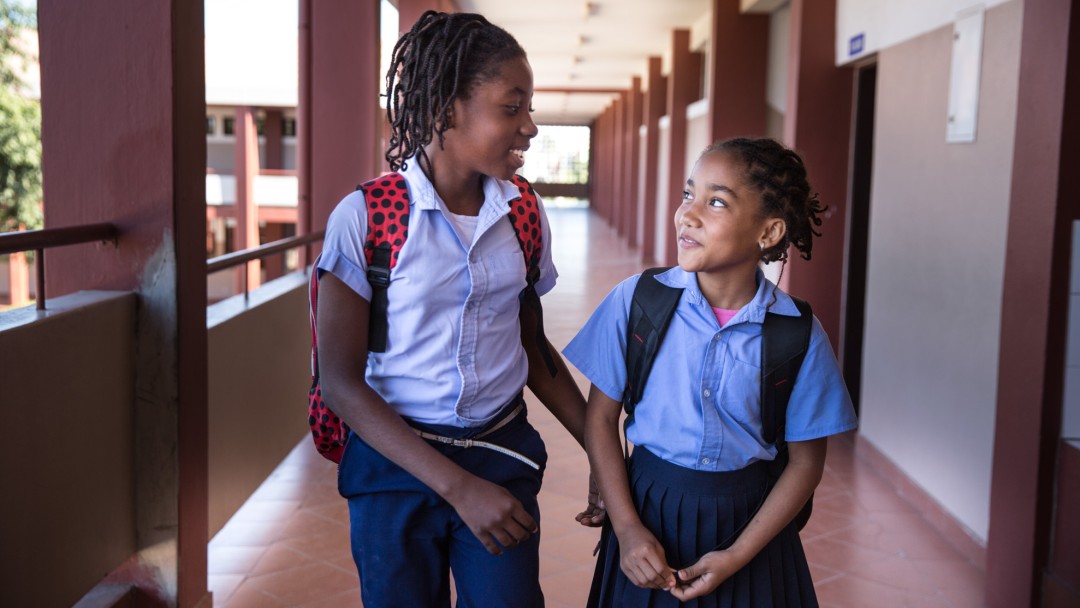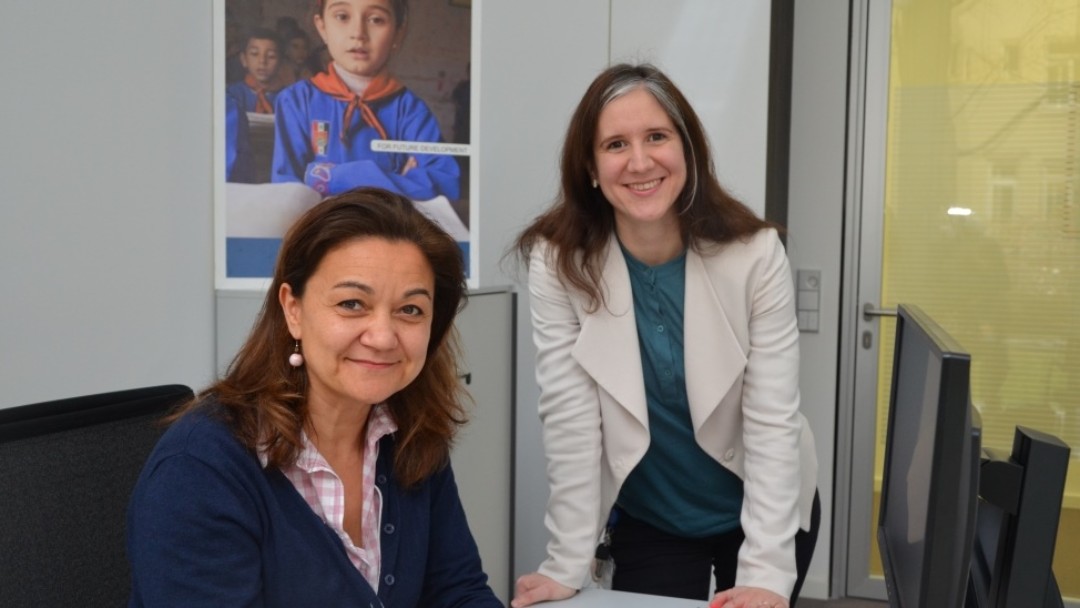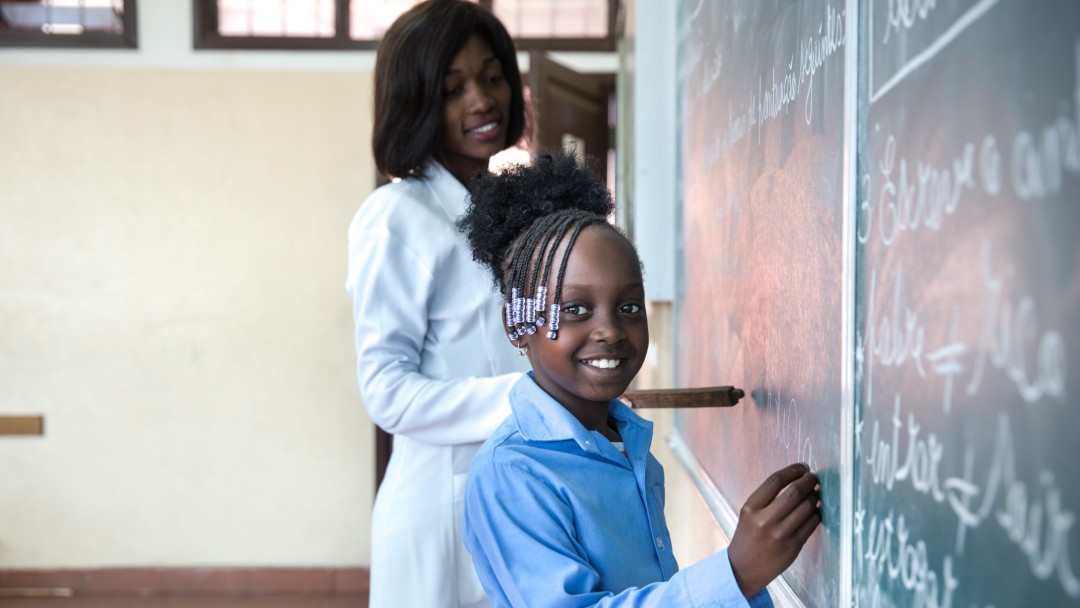News from 2020-03-06 / KfW Development Bank
“Nothing happens automatically”
Arlina Elmiger, KfW Director and Vera Hartmann, Junior Project Manager for Education and Sustainable Economic Development in North Africa, on gender equality.

International Women’s Day has been celebrated on 8 March since 1921 and serves as a reminder of the struggle for gender equality. Since 1977, 8 March has been institutionalised around the world as United Nations Day for Women’s Rights and World Peace, and since 2019 Women’s Day has been a public holiday in Berlin. In the nearly 100 years since it was introduced, considerable progress has been made in achieving equality between women and men. What will be the main issues in the coming years?
Elmiger: I believe that we have made a lot of progress in the area of health and education equality. This is also shown by the Gender Parity Index, which uses certain criteria to determine how gender equality can actually be measured. Economic participation is one area where there are still difficulties, and this is true worldwide. And it’s not just about employment, but also about “equal pay”. Germany also has a relatively poor track record in this area. Other issues include equal opportunity and the percentage of women in management positions. This means that women not only participate in working life and earn well, but have also taken up management positions, not just 30%, but 50%. Considering that 50% of the population of Germany are women and that women have a very high level of education, it is difficult to understand why women should only account for 30% of managers, when in fact the figure should be 50%.
The other issues relate to women’s political participation or representation in parliaments or at ministerial level. And even though we have a female chancellor, Germany has been lagging behind in this area for many years, even compared with some other countries – Rwanda, for example, which ranks ninth in the Gender Parity Index ahead of Germany (ranked tenth). The participation rate of women in parliament in Rwanda is 50%. I think we still have a lot to do in all these areas – besides in our private lives, where we call the shots, but where we also need lots of role models to show what true equality actually means.
Hartmann: I believe that this area is incredibly important as a means of providing access, of creating a level playing field for women and of opening up opportunities in the various sectors of society that were previously closed off. Another aspect that we are less able to influence is the socio-cultural side or the mind-set, which is also part of this and reinforces the first aspect. And this can only happen if more and more women also take on leadership roles and are perceived as competent and strong. And if women’s equal participation in society everywhere is perceived as increasingly self-evident. A change can already be felt, but certainly there is still a lot to be done, especially on a global level, with regard to the cultural perception of women or their role in the family. In other words, role models are needed that can serve as inspiration in private and professional life.
Let’s take a look at KfW. KfW’s gender balance concept was launched in 2013. In this concept KfW commits to supporting a balance between work and private life and to accept different working models for men and women equally. What, in your view, has changed and what still needs to happen?
Elmiger: If you take 2013 as your starting point, something has changed, but I have been at the bank much longer. When I started here at the end of 1997, KfW was much greyer, male and very conventional. When I compare it to the situation today, it’s a world of difference. It feels like a lot has changed, but there is still a lot to do. We are a long way from what we actually want to achieve. However, for some years now there have been many programmes and initiatives such as “Compatibility of family and career”, which include useful and essential elements or support. However, I realise that the actual use of the available tools often depends on the manager. I think that if we were to make greater use of all these tools, it would be a “major push”.
That is one issue. The other issues are the structural or cultural barriers already mentioned. And of course also the questions that men are never even asked like, when you stay at home with a child at first and then return to work: “How do you manage that? How do you find a balance?” Only women are asked these kinds of questions, while men are very rarely asked. Here, too, it should be clearly said what role models are accepted in management positions? There are good models, but we still have a long way to go in terms of actual implementation.
Hartmann: I started in 2016 and was part of a trainee year with mainly women. I have a woman team leader and a woman head of division. I must say that I have never perceived the Development Bank to be overly male. I realise, of course, that my experience is limited, but from a junior perspective I can say that I have never encountered barriers due to my gender here. And at the same time, I am also aware that the difficult times are yet to come: when it comes to family planning and further career development, how the Development Bank addresses the fact that there are equal rights for men and women. This is the big sticking point.

Nearly half of the team leaders at KfW Development Bank are female. This figure is less than one third at the higher management levels. In your opinion, is this because fewer women have ambitions to move up the career ladder?
Elmiger: No, that’s not how I would put it. At least, it is not the cause of this 70% gap. Ambitions are also different in the male world. I believe that a great deal really does depend on finding a balance, and not just work and family, but really career and family. That’s the next step. And individual decisions also play a key role here, e.g. when choosing a partner: are you with someone who supports you and makes this possible? Someone to share the workload at home as a partner?
That is the private side. But it also has a lot to do with role models: what does leadership mean? How do I need to conduct myself if I become head of a division? What is expected of me in terms of attitude, charisma, leadership principles? I think that the new leadership skill model, which is currently being implemented and which focuses on a much stronger team orientation and more coaching, will also appeal to many women who want to embark on a management career A slightly different leadership culture can be an important step towards increasing the participation of women in management positions above the level of team management.
Ms Elmiger, how has the situation of women in partner countries changed during your career in development cooperation?
Here, too, you have to differentiate between the different levels you are operating on. In many developing countries there are a lot of very well-educated women – mostly due to their privileged background. They are then also very competent project partners, at the administrative level, and certainly also in ministerial positions. This is much more common today than in the past, depending on the region. Overall, it is evident that investments in education and healthcare are paying off and that the situation of women has improved considerably as a result. Rwanda is a very good example, but Ethiopia, too, has invested a lot since the new prime minister took office, and has made significant progress on the Gender Parity Index.
If only EUR 1 million were available for a promotional measure, the best single investment with the greatest development impact would be to invest in girls’ education. This serves as leverage for equal rights and active support for women. But unfortunately, nothing happens automatically. It takes political will, and instruments to implement it, as well as structured investment in the right sectors and areas. I can see some movement in this respect, but it cannot be denied that the situation of women is still very dire in many places and in many areas. At the same time, I find it refreshing to see that Rwanda is ahead of Germany when it comes to gender equality.

What challenges do women face in the context of development cooperation?
Elmiger: Even more so than in our country is the fact of being solely responsible for the household. Even though it is not always practiced here, there is at least the opportunity to share the workload. This is not the case in many developing countries – also not in Rwanda. The responsibility for the family lies entirely with the woman, and this dual role of caring for children and the home and going to work is therefore often a major problem. Developing countries have often made significant progress in basic education, but the percentage of women in secondary or tertiary education is still low. This also has to do with the standard role model: you get married and then at the latest your husband doesn’t want you to take the next step in your education. And even when women earn their own money, they can often only spend part of it the way they want.
Was there ever a situation, for example on a business trip, where you were clearly treated differently by the other person because of your gender, i.e. either positively or negatively?
Elmiger: Not yet. Shaking hands is not very common in Arab countries. But this has cultural reasons and not a gender issue.
Ms Hartmann, have you had any gender-specific experiences?
It’s been a mixed bag. I was surprised at how politely I was received by our partners, even though people like me – both young and female – don’t traditionally have a say, especially in the Arab world. This is different as “Head of KfW delegation”, where people listen to you and you can talk on equal footing. It actually becomes more difficult with situations such as visits to construction sites in Upper Egypt, where the villagers do not intuitively perceive you as the head of the delegation. And it is precisely when travelling with male experts that you repeatedly have to be pushy in order to talk to the building contractors. You are intuitively ignored, or you are sent to talk to the teachers, which can also be an advantage. I think that as a woman you sometimes have completely different, closer access to the target group. For example, women take me to the toilets and show me that the toilet doors do not close. These are things that the contractor doesn’t realise. In other words, this can also be useful. On the other hand, it requires a certain standing to tell the contractor in no uncertain terms that he is late and needs to take measures now. He perceives this differently when it is said by a young woman and not an experienced architect.
Elmiger: But I find the idea of closer access interesting because I wonder if it would be similar with men. But these situations really happen where you establish a special closeness with women and then suddenly start talking to them under a tree about how contraception works – such an intimate and open relationship would probably not have existed with a man as head of the delegation. I would definitely see this as an advantage.
Hartmann: At the same time, I also have to say that the experience we bring with us as a development bank plays a role and can be beneficial. For example, if I was there to visit an engineering company and had to sell something to my partner, I could imagine that as a woman I would have a much harder time. But this may also be due to the fact that women are less common in the construction and engineering sectors in the countries where I work.
Your outlook for gender equality?
Elmiger: A lot has been achieved, but we still have a long way to go, and it will take generations. What really horrifies me: I read that if we continue at the pace we are going at now, we will achieve “gender parity” in 99 years! That is shocking! Many men are a bit worried that there will be no more positions for men due to quotas and that only women will be promoted. I have also read that if Germany continues at this rate, by 2040 we will have a third of the positions at board level filled by women! But there is still a long, long way to go. And nothing happens automatically – everything that we have achieved is hard won.
Hartmann: Perhaps one final thought about development cooperation: we sometimes tend to look only at the numbers – how many girls go to the school we are funding, how many schools of this kind we are supporting, etc. But we also have to look behind the numbers, at the possibilities, the overall conditions, the cultural circumstances, which ultimately decide whether women can really take advantage of the opportunities. Very small factors play a role here, such as the distance to school, parents who say: “I don’t want to send my daughter that far. It is dangerous for her.” And in certain contexts or regions it can be really dangerous for them. To find out, you have to talk to people. What really prevents women or girls from taking advantage of the available infrastructure? I think this is the gender focus needed in development cooperation.
Elmiger: Exactly. Little things like “monthly hygiene”, which is not available at some schools, are often the reason why girls simply stay at home during this time. This is a quarter of the time at school! If we take a closer look at what really prevents the girls from going to school, it of course makes the measures much more complex, but probably also much more effective.
Hartmann: This may mean that you don’t support the school that has a big percentage of girls, but the school that maintains functioning sanitary facilities. It can certainly change a measure if you look behind the numbers.

Share page
To share the content of this page with your network, click on one of the icons below.
Note on data protection: When you share content, your personal data is transferred to the selected network.
Data protection
Alternatively, you can also copy the short link: https://www.kfw-entwicklungsbank.de/s/enzBWrMC.CLgA
Copy link Link copied